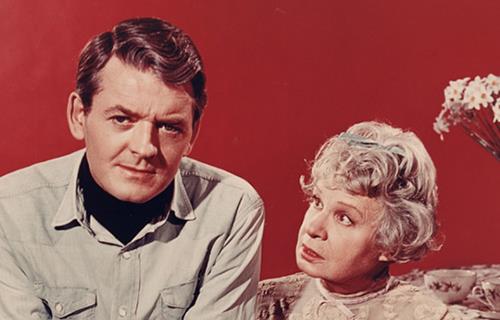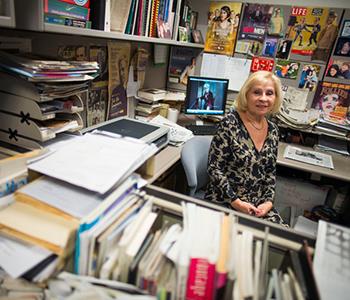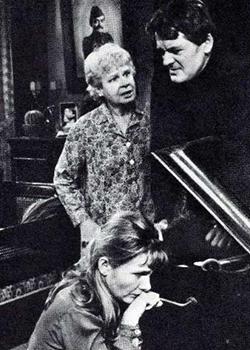
A superb CBS production of Tennessee Williams’ The Glass Menagerie, presumed lost following its 1966 premiere, returns to TV tonight on TCM. Here’s the behind-the-scenes story, from those who found, restored, and scheduled the special, and from its surviving star, Hal Holbrook…
“We like to bring very rare things on TCM that people can’t see anywhere else,” says Charles Tabesh, senior vice president of programming and production for Turner Classic Movies. The Glass Menagerie certainly qualifies.
An acclaimed CBS Playhouse special premiering on Dec. 8, 1966, it featured a cast personally approved by playwright Williams. Shirley Booth as stifling mother Amanda, Barbara Loden as curio-collecting daughter Laura, Hal Holbrook as the rebellious son Tom and as the play’s narrator, and Pat Hingle as Jim, Laura’s “Gentleman Caller.”
David Susskind was the special’s executive producer, and the program was a British co-production, filmed in London and shown in England as well. Directing for television was acclaimed British TV director Michael Elliott, who by that time already had mounted made-for-TV productions of Anton Chekhov’s The Cherry Orchard with John Gielgud, Peggy Ashcroft and Judi Dench, and William Shakespeare’s As You Like It with Vanessa Redgrave and Ian Richardson. It was a class act all the way.
I remember seeing The Glass Menagerie in 1966, when I was 13 years old, and being blown away by it, just as forcefully as I was by another brilliant TV production of a Broadway play presented that same year on CBS: Arthur Miller’s Death of a Salesman, starring Lee J. Cobb. But I didn’t see this particular production of The Glass Menagerie again until the other day, when I previewed the restoration that will be unveiled tonight (Thursday) at 8 p.m. ET on TCM. It’s something to see, all right – a fabulous, emotional, sensitive production, beautifully photographed and, by Holbrook and Loden especially, impeccably acted.
The only difference between the new TCM presentation and my memory of the 1966 Glass Menagerie is that this new one is in color, while I vividly recall watching the original in black and white. At first, I presumed it was colorized as part of the digital restoration process – but no. It’s just that when the show premiered 50 years ago, my family was watching TV on a black-and-white set. Nothing was in color – at least not to us.
Dan Wingate, a long-time former restoration specialist for Sony Pictures Entertainment now running his own Wingate Enterprises restoration shop out of Los Angeles, laughed when I told him that. He’s a bit younger than I am, but he remembers “being horrified” the first time he saw, in color, the kitchen from The Brady Bunch that he had watched in black-and-white in his childhood: “It’s orange! It’s green!”
His restoration efforts for The Glass Menagerie are impressive, because Wingate wasn’t just polishing and cleaning up a 50-year-old TV production. He was recreating it. No master tape exists, or at least has yet been found, of the 1966 special, in the U.S. or in England. An audiotape, recorded by a fan archivist from the prime-time broadcast, was the only complete record. But then Jane Klain, the research services manager at New York’s Paley Center for Media, found the key pieces to this long-lost puzzle.
 To say that Klain (at right), in her research efforts, is dogged and determined is to do her a disservice. Her persistence makes Columbo look like a slacker, and she’s always on the case, burrowing through collections and archives, and making phone calls and follow-up emails, in search of yet another long-lost piece of TV history. She was the one who located the audio recording of The Glass Menagerie – and also the one who found a mere mention of the title in a list of David Susskind materials donated to USC. It turned out to be six hours of two-inch quad videotape. It didn’t include a copy of the final broadcast, though, just the tapes from the various camera takes.
To say that Klain (at right), in her research efforts, is dogged and determined is to do her a disservice. Her persistence makes Columbo look like a slacker, and she’s always on the case, burrowing through collections and archives, and making phone calls and follow-up emails, in search of yet another long-lost piece of TV history. She was the one who located the audio recording of The Glass Menagerie – and also the one who found a mere mention of the title in a list of David Susskind materials donated to USC. It turned out to be six hours of two-inch quad videotape. It didn’t include a copy of the final broadcast, though, just the tapes from the various camera takes.
“Most of the technicians working on this in England,” Wingate explains, “were used to live TV, so these were extended five-minute pieces or longer. We took pieces from this take, then from that take. We had everything.” Wingate reconstructed the master tape by listening to the surviving audio recording, identifying which takes had been chosen for the final 1966 production, then putting those pieces together. The tapes were transferred by David Crosthwait at DC Video, and the tapes with advanced deterioration were worked on by Ariel Ticsay at Advanced Digital Services – labors of love encouraged and instigated by Klain, who calls herself the “Nancy Drew” of this story. Then Wingate played Dr. Frankenstein, piecing it all together. But this was no monster. It’s a masterpiece.
It was such a tightly rehearsed and professionally filmed production, Wingate adds, that no more than four takes were recorded of any of the play’s scenes, no matter how extended or difficult. Wingate was especially impressed by Holbrook’s long, unbroken scenes as narrator, which took only one or two takes to perform brilliantly. “He pretty much nailed his stuff right off the bat,” Wingate marvels.
 “I knew the role very well,” Holbrook, now 91, told me yesterday. “I always loved the role, and knew the lines. I made sure I memorized the lines cold, cold, cold. I never had to think about lines. It’s something I do as a professional actor,” he added proudly.
“I knew the role very well,” Holbrook, now 91, told me yesterday. “I always loved the role, and knew the lines. I made sure I memorized the lines cold, cold, cold. I never had to think about lines. It’s something I do as a professional actor,” he added proudly.
Holbrook has very kind words for, and fond memories of, Shirley Booth in the role of the mother – but also recalls she was haunted and intimidated by the memory of Laurette Tayor, whose performance in the original 1946 stage production was, as Holbrook remembers, “so extraordinary, it would have intimidated anyone.” Booth therefore had a little difficulty remembering her lines. But when I asked Holbrook whether his affinity for speaking the words of Samuel Clemens in Mark Twain Tonight! (which will have its own golden TV anniversary next year, by the way) aided him in performing those soliloquys as narrator written by Williams for Glass Menagerie, Holbrook positively bristled.
“There’s absolutely no correlation between that and Mark Twain,” he said emphatically. “That is, to me, a cornball idea. Because I do Mark Twain? Bullshit. That has nothing to do with it. I’m an actor. It doesn’t matter what goddam role I’m doing. I’ve done many roles in my life where I’ve had long speeches.”
But watch him tonight, and you’re likely to marvel at how perfectly he drawls his way through Williams’ flowery language and lengthy cadences. The fact that you can watch tonight is another reason to thank Klain. “It started with a call from Jane,” TCM’s Tabesh says of his decision to schedule The Glass Menagerie. She not only found it, and suggested Tabesh should make room for it on his network, but suggested the golden-anniversary telecast date, 50 years to the day after its initial telecast. He set the date aside, and added The Glass Menagerie to his schedule when the program was assembled and restored – a process so involved, it wasn’t delivered to TCM until Tuesday. Tabesh has yet to see it.
“Every so often, she suggests something,” he says of Klain. “I have complete trust and confidence in her knowledge on this sort of thing.”
“It’s as perfect as it can be,” Klain says of the final restoration. She plans to watch it on TCM tonight – and so does Holbrook, who hasn’t seen it in half a century.
“I would very much like to see it again,” he says. “It’s a beautiful play.”